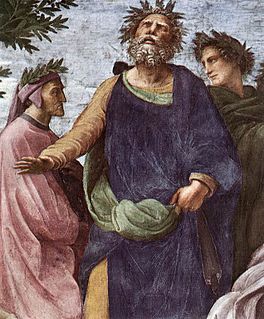
The Tragedy of Hamlet, Prince of Denmark, often shortened to Hamlet, is a tragedy written by William Shakespeare sometime between 1599 and 1601. It is Shakespeare's longest play, with 30,557 words. Set in Denmark, the play depicts Prince Hamlet and his revenge against his uncle, Claudius, who has murdered Hamlet's father in order to seize his throne and marry Hamlet's mother.

In sociology, anthropology, archaeology, history and linguistics, structuralism is a general theory of culture and methodology that implies that elements of human culture must be understood by way of their relationship to a broader system. It works to uncover the structures that underlie all the things that humans do, think, perceive, and feel.

The Western canon is the body of high culture literature, music, philosophy, and works of art that is highly valued in the West: works that have achieved the status of classics. However, not all these works originate in the Western world, and such works are also valued throughout the world. It is "a certain Western intellectual tradition that goes from, say, Socrates to Wittgenstein in philosophy, and from Homer to James Joyce in literature". The word canon is derived from ancient Greek κανών, kanṓn, meaning a measuring rod, or standard. The Bible, a product of ancient Jewish culture, from the Levant, in Western Asia, has been a major force in shaping Western culture, and "has inspired some of the great monuments of human thought, literature, and art".
Psychoanalytic literary criticism is literary criticism or literary theory which, in method, concept, or form, is influenced by the tradition of psychoanalysis begun by Sigmund Freud.
Feminist literary criticism is literary criticism informed by feminist theory, or more broadly, by the politics of feminism. It uses the principles and ideology of feminism to critique the language of literature. This school of thought seeks to analyze and describe the ways in which literature portrays the narrative of male domination by exploring the economic, social, political, and psychological forces embedded within literature. This way of thinking and criticizing works can be said to have changed the way literary texts are viewed and studied, as well as changing and expanding the canon of what is commonly taught. It is used a lot in Greek myths.

Literary theory is the systematic study of the nature of literature and of the methods for literary analysis. Since the 19th century, literary scholarship includes literary theory and considerations of intellectual history, moral philosophy, social prophecy, and interdisciplinary themes relevant to how people interpret meaning. In the humanities in modern academia, the latter style of literary scholarship is a development of critical theory. Consequently, the word theory became an umbrella term for scholarly approaches to reading texts, some of which are informed by strands of sociology and Continental philosophy.

Literary criticism is the study, evaluation, and interpretation of literature. Modern literary criticism is often influenced by literary theory, which is the philosophical discussion of literature's goals and methods. Though the two activities are closely related, literary critics are not always, and have not always been, theorists.
Allan David Bloom was an American philosopher, classicist, and academician. He studied under David Grene, Leo Strauss, Richard McKeon, and Alexandre Kojève. He subsequently taught at Cornell University, the University of Toronto, Tel Aviv University, Yale University, École Normale Supérieure of Paris, and the University of Chicago. Bloom championed the idea of Great Books education and became famous for his criticism of contemporary American higher education, with his views being expressed in his bestselling 1987 book, The Closing of the American Mind. Characterized as a conservative in the popular media, Bloom denied that he was a conservative, and asserted that what he sought to defend was the "theoretical life". Saul Bellow wrote Ravelstein, a roman à clef based on Bloom, his friend and colleague at the University of Chicago.

Sexual Personae: Art and Decadence from Nefertiti to Emily Dickinson is a 1990 work about sexual decadence in Western literature and the visual arts by scholar Camille Paglia, in which she addresses major artists and writers such as Donatello, Sandro Botticelli, Leonardo da Vinci, Edmund Spenser, William Shakespeare, Johann Wolfgang von Goethe, Samuel Taylor Coleridge, Lord Byron, Emily Brontë, and Oscar Wilde. Following Nietzsche, Paglia argues that the primary conflict in Western culture is between the binary forces of the Apollonian and Dionysian, Apollo being associated with order and symmetry, and Dionysus with chaos, disorder, and nature. The book received critical reviews from numerous feminist scholars, but was praised by numerous literary critics.

Stephen Jay Greenblatt is an American Shakespearean, literary historian, and author. He has served as the John Cogan University Professor of the Humanities at Harvard University since 2000. Greenblatt is the general editor of The Norton Shakespeare (2015) and the general editor and a contributor to The Norton Anthology of English Literature.
New Criticism was a formalist movement in literary theory that dominated American literary criticism in the middle decades of the 20th century. It emphasized close reading, particularly of poetry, to discover how a work of literature functioned as a self-contained, self-referential aesthetic object. The movement derived its name from John Crowe Ransom's 1941 book The New Criticism.
Elaine Showalter is an American literary critic, feminist, and writer on cultural and social issues. She is one of the founders of feminist literary criticism in United States academia, developing the concept and practice of gynocritics, a term describing the study of "women as writers".

Leslie Aaron Fiedler was an American literary critic, known for his interest in mythography and his championing of genre fiction. His work incorporates the application of psychological theories to American literature. Fiedler's most renowned work consists of Love and Death in the American Novel (1960). A retrospective article on Leslie Fiedler in the New York Times Book Review in 1965 referred to Love and Death in the American Novel as "one of the great, essential books on the American imagination. .. an accepted major work." This groundbreaking work views in depth both American literature and character from the time of the American Revolution to the present. From it, there emerges Fiedler's once scandalous—now increasingly accepted—judgement that our literature is incapable of dealing with adult sexuality and is pathologically obsessed with death.
Our great novelists, though experts on indignity and assault, on loneliness and terror, tend to avoid treating the passionate encounter of a man and a woman, which we expect at the center of a novel. Indeed, they rather shy away from permitting in their fictions the presence of any full-fledged, mature women, giving us instead monsters of virtue or bitchery, symbols of the rejection or fear of sexuality.

Annette Kolodny was an American feminist literary critic and activist, held the position of College of Humanities Professor Emerita of American Literature and Culture at the University of Arizona in Tucson. Her major scholarly writings examined the experiences of women on the American frontiers and the projection of female imagery onto the American landscape. Her other writings examined some aspects of feminism after the 1960s; the revision of dominant themes in American studies; and the problems faced by women and minorities in the American academy.
"Tradition and the Individual Talent" (1919) is an essay written by poet and literary critic T. S. Eliot. The essay was first published in The Egoist (1919) and later in Eliot's first book of criticism, "The Sacred Wood" (1920). The essay is also available in Eliot's "Selected Prose" and "Selected Essays".

Shakespeare's Politics is a 1964 book by Allan Bloom and Harry V. Jaffa, in which the authors provide an analysis of four Shakespeare plays guided by the premise that political philosophy provides a necessary perspective on the problems of Shakespeare’s heroes. Its methods and interpretations were significantly influenced by Leo Strauss, who taught Jaffa at the New School for Social Research and Bloom at the University of Chicago, and to whom the book is dedicated.

Camille Anna Paglia is an American feminist academic and social critic. Paglia has been a professor at the University of the Arts in Philadelphia, Pennsylvania, since 1984. She is critical of many aspects of modern culture and is the author of Sexual Personae: Art and Decadence from Nefertiti to Emily Dickinson (1990) and other books. She is also a critic of contemporary American feminism and of post-structuralism, as well as a commentator on multiple aspects of American culture such as its visual art, music, and film history.

Harold Bloom was an American literary critic and the Sterling Professor of Humanities at Yale University. He is often cited as the most influential English-language critic of the late 20th century. Following the publication of his first book in 1959, Bloom wrote more than 50 books, including 20 books of literary criticism, several books discussing religion, and a novel. During his lifetime, he edited hundreds of anthologies concerning numerous literary and philosophical figures for the Chelsea House publishing firm. Bloom's books have been translated into more than 40 languages.

The Western Canon: The Books and School of the Ages is a 1994 book about western literature by the critic Harold Bloom, in which the author defends the concept of the Western canon by discussing 26 writers whom he sees as central to the canon.
New historicism, a form of literary theory which aims to understand intellectual history through literature and literature through its cultural context, follows the 1950s field of history of ideas and refers to itself as a form of "Cultural Poetics". It first developed in the 1980s, primarily through the work of the critic Stephen Greenblatt, and gained widespread influence in the 1990s. Greenblatt coined the term new historicism when he "collected a bunch of essays and then, out of a kind of desperation to get the introduction done, he wrote that the essays represented something called a 'new historicism'".











